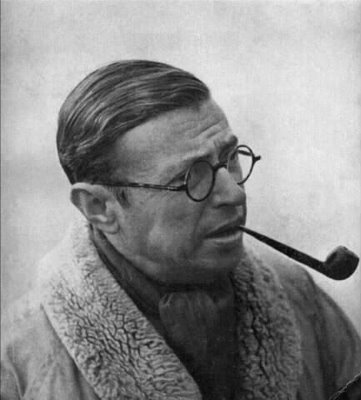Existentialism: a philosophical movement that focuses on individual autonomy and the necessity of making reasoned decisions for oneself.
Jean-Paul Sartre, (1905-1980)
- French author and philosopher
- Best-known proponent of humanistic existentialism
- A Marxist advocate of political causes
- French resistance fighter of WWII
- Winner of the Nobel Prize for literature
Sartre was an atheist who believed that human beings had no particular purpose in living. He said that no divine master plan governs human existence; all events are random; nothing makes sense, and life is absurd. As a result, Sartre declared that existence precedes essence.
Each person creates their own essence—by defining herself, determining what she will be, and choosing what she values. In the existential view, everything—actions, beliefs, feelings, and attitudes—is a matter of choice. But no moral milestones exist to help guide these choices.
For Sartre, because there is no God, there is no objective standard of values: “It is very troubling that God does not exist…for with him disappears every possibility of finding values…there can no longer be any good a priori.” Consequently, because a Godless world has no objective values, we must establish or invent our own values.
Though existentialists offer no moral milestones for judging ethical decisions, they do place great importance on authenticity. Existentialists believe a good person to be one who recognizes his or her freedom and responsibility—and makes authentic choices.
According to Sartre, it is only through acceptance of our responsibility that we may live in authenticity. To be responsible, to live authentically, means intentionally making choices about one’s life and one’s future. Therefore, to find meaning in life, the individual must create his or her world and its values by making authentic choices.
Ethics is a matter of individual responsibility.
Sartre also maintained that if existence precedes essence, people cannot use human nature to excuse evil deeds and poor choices. In his view, there is no human nature. People are free and alone—alone because God does not exist. As a result, people have no one to blame but themselves.
Contemporary philosopher, Robert Holmes wrote, “For most, adolescence brings an unsettling awareness that the comforting framework of values taken for granted as children is not fixed and unchanging…This moment is crucial. If on realizing this, people refuse to accept their freedom in the face of the collapse of their childhood faith, they choose a life of self-deception. They choose to deny their freedom.”
Existentialists believe that responsibility for making choices cannot be evaded. Even refusing to choose involves a choice: the choice not to choose.
The individual trying to define himself or herself finds no external answers. In Sartre’s words, we are “condemned to be free,” unshaped by any external moral law or values. Having made our own choices, we must accept the full burden and responsibility of our freedom. By choosing one way or another, we become examples to others. We are making a personal statement in our choice which is: This is how I think I should act.
Sartre also believed that we should act in a way that respects the freedom of others. Only by having respect for others and for their freedom can everyone have the freedom to be themselves.
Sartre and Kant on Ethics
“I choose myself perpetually,” Sartre wrote. By this, he meant that we each are in a continual process of constructing ourselves and our values or ethics. And, as discussed in the text, Sartre believed that when a person determines something to be right for him- or herself, he or she is also determining it to be good for all.
This universalization of individual choices is reminiscent of Kant’s supreme precept of morality; the categorical imperative, according to which you must only act in such a way that the principle on which you act could be a universal law.
Kant, however, grounded the categorical imperative and hence all morality in reason, which he thought determines a priori what is right and wrong.
Sartre, however, maintains that there is no a priori moral law and that Kant’s formal law is inadequate as a guide for concrete action in everyday life.
It is rather what a person does that in fact determine his morality. “In choosing myself, I choose man,” Sartre said. It is perhaps arguable, however, that this principle (“in choosing myself, I choose man”) is for Sartre a universal principle underlying morality. Taken from, Philosophy: The Power of Ideas 2nd Edition.

